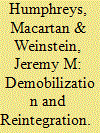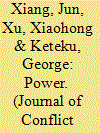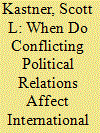| Srl | Item |
| 1 |
ID:
078685


|
|
|
|
|
| Publication |
2007.
|
| Summary/Abstract |
Since 1989, international efforts to end protracted conflicts have included sustained investments in the disarmament, demobilization, and reintegration (DDR) of combatants. Yet while policy analysts have debated the factors that contribute to successful DDR programs and scholars have reasoned about the macro conditions that facilitate successful peace building, little is known about the factors that account for successful reintegration at the micro level. Using a new dataset of ex-combatants in Sierra Leone, this article analyzes the individual-level determinants of demobilization and reintegration. Past participation in an abusive military faction is the strongest predictor of difficulty in achieving social reintegration. On economic and political reintegration, we find that wealthier and more educated combatants face greater difficulties. Ideologues, men, and younger fighters are the most likely to retain strong ties to their factions. Most important, we find little evidence at the micro level that internationally funded programs facilitate demobilization and reintegration
|
|
|
|
|
|
|
|
|
|
|
|
|
|
|
|
| 2 |
ID:
078686


|
|
|
|
|
| Publication |
2007.
|
| Summary/Abstract |
Conflicts between European Union (EU) members about enlargement result from its redistributive effects. EU members are more likely to suffer from enlargement if they profit from EU transfers and if they are relatively close to applicant countries in which unemployment is significantly higher than in member countries. Phasing in membership rights serves to compensate the relative losers of enlargement to accomplish EU widening. Using data from all previous enlargement rounds until 2004, we demonstrate that EU members are more likely to demand a discrimination of new members if distributional conflicts arise. The existence of these distributional conflicts in turn increases the odds of EU members and the accession candidates actually agreeing on a phase-in period.
|
|
|
|
|
|
|
|
|
|
|
|
|
|
|
|
| 3 |
ID:
078689


|
|
|
|
|
| Publication |
2007.
|
| Summary/Abstract |
We join the debate on trade interdependence and conflict with a reexamination of Barbieri's (1996) intriguing empirical results showing that under certain circumstances, trade interdependence causes conflict. We argue that these findings resulted from a specification that was missing a variable. We return to Barbieri's models and introduce two independent power measures for countries within each dyad. When a correctly specified trade-conflict regression model incorporating the new power variables is performed, the constraining effect of interdependence becomes evident, and the results obtained are the reverse of Barbieri's.
|
|
|
|
|
|
|
|
|
|
|
|
|
|
|
|
| 4 |
ID:
078688


|
|
|
|
|
| Publication |
2007.
|
| Summary/Abstract |
Leaders compensate supporters not just for performing their duties but also to preempt an overthrow by the same supporters. We show how succession rules affect the power of leaders relative to supporters as well as the resources expended on possible succession struggles. We compare two regimes of leadership succession: the conclave regime and the divide-et-impera regime, which differ with respect to the role of supporters of the previous leader once the new leader takes power. The leadership rent is higher, and supporters receive a lower compensation in the divide-et-impera regime, as supporters have to fight harder for succession to avoid the grim outcome of loss. A leader, then, would like to induce the divide-et-impera regime even when every supporter has veto power over her leadership
|
|
|
|
|
|
|
|
|
|
|
|
|
|
|
|
| 5 |
ID:
078690


|
|
|
|
|
| Publication |
2007.
|
| Summary/Abstract |
Limited commercial integration between India and Pakistan or within much of the Middle East suggests that conflicting political interests between countries can have a detrimental effect on their economic relations. But rapidly growing economic ties between Mainland China and Taiwan show that commerce can also flourish even in the presence of very hostile relations. I explore this variation and hypothesize that the effects of international political conflict on trade are less severe in cases where internationalist economic interests have relatively strong political clout domestically. Simple quantitative tests on a sample of seventy-six countries over the years 1961 to 1992 are supportive; further evidence is provided via a brief case study of Mainland China-Taiwan relations.
|
|
|
|
|
|
|
|
|
|
|
|
|
|
|
|
| 6 |
ID:
078687


|
|
|
|
|
| Publication |
2007.
|
| Summary/Abstract |
This article examines states' decisions to commit to human rights treaties. It argues that the effect of a treaty on a state-and hence the state's willingness to commit to it-is largely determined by the domestic enforcement of the treaty and the treaty's collateral consequences. These broad claims give rise to several specific predictions. For example, states with less democratic institutions will be no less likely to commit to human rights treaties if they have poor human rights records, because there is little prospect that the treaties will be enforced. Conversely, states with more democratic institutions will be less likely to commit to human rights treaties if they have poor human rights records-precisely because treaties are likely to lead to changes in behavior. These predictions are tested by examining the practices of more than 160 countries over several decades
|
|
|
|
|
|
|
|
|
|
|
|
|
|
|
|